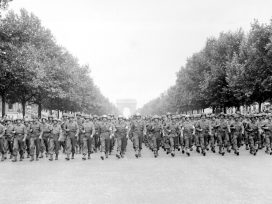
Since the collapse of Novi Sad’s train station in November, student-led protests have erupted across Serbia, inspiring a nationwide movement against corruption.
Raymond Aron’s book In Defense of Decadent Europe was published in 1977. It was the time of pervasive pessimism and doubts about the future of both democracy and Europe. European economies were knocked down by the 1973 energy crisis. The students’ movements of the 1960s and the wave of terrorism that followed in countries like West Germany and Italy shattered European societies. In general, the 1970s looked to their contemporaries as a crossroads of blind alleys. Europe’s role in the world politics was in decline.
Re-reading Aron’s book in 2014 gives us better sense of the current crisis. It suggests that we have been here before but it also warns that the fact that we survived then does not guarantee that we will survive today. Because Aron’s defence of Europe is not a book about Europe but about the delusions of Marxism, the intrinsic instability of the communist regimes and the tendency of European intellectuals to fall in love with apocalyptic self-criticism. So, Aron was right that democratic capitalism and not Soviet communism is the future of the world. But now when communism is history, how should we write in defence of decadent Europe.
The European Union no longer exists, at least not as we know it. All of the pillars that served to build and justify the existence of the European Union have collapsed.
A survey of German secondary school students in the 14-16 age bracket, which was published a little over a year ago, showed that a third of these young people did not know who Hitler was, and 40 per cent were convinced that human rights had been respected to an equal degree by every German government since 1933. This in no way implies that there is nostalgia for fascism in Germany. No, it simply means that we now have to contend with a generation that has nothing to do with this history. Today the conviction that the EU continues to derive legitimacy from its roots in the war is in an illusion.
Today, the EU does not have – and cannot have – an enemy that can justify its existence in the same manner as the post-1949 USSR.
The third pillar that has crumbled is prosperity. The EU continues to be very rich – even if this observation does not apply to all its member states however, 60 per cent of Europeans believe that their children will not live as well as they do.
Another source of legitimacy was a belief in convergence, which led poor countries joining the EU to expect that they would progressively acquire advantages in tune with membership of a rich man’s club. This still had some basis in fact a few years ago, but today, if the economic forecasts for the next 10 years are to be believed, a country like Greece is likely to remain as poor in comparison to Germany as it was on the day of its accession to the Union.
So, the defence of decadent Europe is possible only on the field of ideas and here is the real question, one that Marcin Krol has constantly addressed in the last decade. Why has the spread of democracy in Europe made European intellectuals (with some exceptions) unable to think through the dilemmas of modern democracies? Why did Europe surrender its universalistic appeal?
What until just yesterday seemed universally applicable in the European experience begins to look exceptional today. Even a passing glance at China, India and Russia, not to speak of the vast reaches of the Muslim world, makes clear that both ethnic nationalism and religion remain major ideological driving forces shaping global politics. Postmodern post-nationalism and secularism are making Europe different from the rest of the world, not making the rest of the world more like Europe.
In the world’s rising ideological cycle liberalism is in retreat. Indeed, ethnic nationalism and religion are not only ever more present in the non-European world; they are also more present within Europe itself. Brussels as the capital of the European Union is very different in spirit from Brussels as the capital of Belgium. The former is in love with diversity and multiculturalism; the latter is witnessing the rise of symbolic politics and the return of the ghost of ethnically driven partition. The crisis has put post-national politics on trial. It has evoked collective national experiences and revived national narratives long thought shut up in metaphorical archives.
So, how should one write in defence of decadent Europe today? And who could he be? Marcin Krol?
Published 7 July 2014
Original in English
First published by Res Publica Nowa 25 (2014)
Contributed by Res Publica Nowa © Ivan Krastev / Res Publica Nowa / Eurozine
PDF/PRINTSubscribe to know what’s worth thinking about.

Since the collapse of Novi Sad’s train station in November, student-led protests have erupted across Serbia, inspiring a nationwide movement against corruption.

The Second World War no longer serves as a history of the western European present. The current era is marked by a different set of problems, not least the fading appeal of the model of democracy installed after 1945.